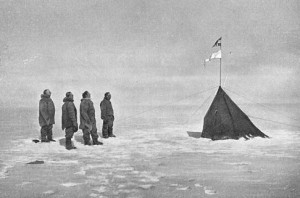Good morning.
Saturday brings a near-certainty of snow to Whitewater, with a high of twenty-seven. Accumulations may amount to two inches or so.
On this day in 1911, Norwegian Roald Amundsen becomes the first person to reach the South Pole:

Amundsen, born in Borge, near Oslo, in 1872, was one of the great figures in polar exploration. In 1897, he was first mate on a Belgian expedition that was the first ever to winter in the Antarctic. In 1903, he guided the 47-ton sloop Gjöa through the Northwest Passage and around the Canadian coast, the first navigator to accomplish the treacherous journey. Amundsen planned to be the first man to the North Pole, and he was about to embark in 1909 when he learned that the American Robert Peary had achieved the feat.
Amundsen completed his preparations and in June 1910 sailed instead for Antarctica, where the English explorer Robert F. Scott was also headed with the aim of reaching the South Pole. In early 1911, Amundsen sailed his ship into Antarctica’s Bay of Whales and set up base camp 60 miles closer to the pole than Scott. In October, both explorers set off–Amundsen using sleigh dogs, and Scott employing Siberian motor sledges, Siberian ponies, and dogs. On December 14, 1911, Amundsen’s expedition won the race to the Pole and returned safely to base camp in late January.
On 12.14.1893, Frederick Jackson Turner delivers an historic – and in this case historical – address:
1893 – Frederick Jackson Turner Delivers Frontier Address
On this date Frederick Jackson Turner delivered the “Significance of the Frontier in American History” address at the forty-first annual meeting of the State Historical Society of Wisconsin. [Source: SHSW Proceedings, 1893, pg. 79-112]
